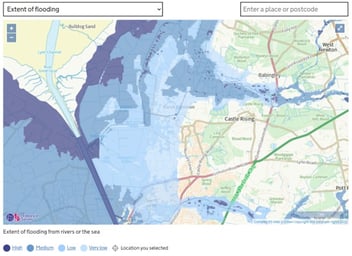If you're a construction professional, you know that weather can hugely impact your business. That's why it's important to have access to accurate and reliable weather forecasts. But climate change has caused global weather to be more unreliable than the legendary British weather.
Climate change is causing more erratic and extreme weather patterns each month. In just 2022, we've seen strong winds grounding flights in the UK, relentless rains flooding Australia, and now – as spring arrives – unseasonal snowfall in parts of Turkey, Greece, Cyprus and Israel. And it even snowed in the Sahara Desert in 2018.

(Image source: @Strange_Sounds via Twitter)
Stay Ahead of the Weather at Every Stage of Your Construction Project
Extreme weather and erratic weather patterns are a nightmare for the construction industry. Weather changes can affect construction projects, from expensive delays to health risks. The objective for construction project managers is reducing weather effects right from the planning stage to delivering projects. Contractors must now anticipate the impact of everyday weather changes on their operations. But where can construction professionals turn for the best weather data?
Below, we discuss where to find the most reliable construction weather forecasts. We'll also talk about how to use this information to improve your business operations.
Sources of Reliable Construction Weather Forecast
There are plenty of weather forecasting resources available, from local television to national weather services. However, these sources can vary in accuracy and may not be specific enough for construction professionals. Here are some more reliable sources for construction weather forecasts:
EHAB Weather Risk Management Platform
The EHAB Weather Risk Management Platform is valuable for construction professionals looking for reliable weather data. This platform offers hyper-local climate data, providing accurate construction planning and operations information. The platform integrates with existing tools and workflows, including P6 and PRA software.
It also offers relevant weather warnings to allow for proactive risk management planning. Additionally, the EHAB platform offers 2-week forecast data to allow for long-term construction planning and scheduling.
EHAB has partnered with the IBM run Weather Company to deliver the most accurate weather data to construction professionals. The Weather Company consistently comes out on top in the global rankings of weather data providers and EHAB leverages this data in its platform to offer state of the art insights.
IBM brings its AI and Machine learning driven supercomputers to the table as well as a constellation of data providers, including hobbyists who provide data from micro stations around the UK and the world.
Machine learning and crowdsourcing are both techniques EHAB deploys in its platform too which helps blend the state of the art IBM data with granular construction data to give everyone on the construction project the best forecast and impact information available.
Sign up for a free 30-minute demo to see how the EHAB Weather Risk Management Platform can help improve your construction business operations.
The Met Office
The Met Office is the UK's national weather service. They offer a wide range of weather services, including forecasts for specific regions and industries. The Met Office is considered a reliable source of weather data, and their forecasts are often used in construction planning. Other benefits of using the Met Office for weather data include:
- Internationally-renowned research to study the effects of climate change
- Over four decades of experience in the construction industry
- The default for meteorological data for contract management
- Round-the-clock location-specific forecasts and alerts
Historical Weather Data
Historical weather data can be a valuable resource for construction professionals. By studying past weather patterns, construction companies can better understand what to expect in the future. This information can be used to plan for potential weather-related delays or to choose the right materials for a project.
Predictive Models
Predictive models are computer programs that use historical data to forecast future conditions. They take historical data as input and then use algorithms to predict future weather conditions. These models can be helpful for construction professionals, as they can provide detailed information on temperature, precipitation, and wind speed.
Weather Experts
Local weather experts can be a valuable resource for construction sites. These experts know the local weather conditions and can provide specific forecasts for your area.
One critical point is that local experts are not necessarily trained meteorologists or affiliated with national weather services. These are usually people with intimate knowledge of the local weather patterns and geography.
For example, a local weather expert may be able to tell you that building in a certain area has historically had challenges due to water accumulation or sudden wind gusts due to a physical structure nearby. Another example is where you have a construction site at a location that's downstream of a seasonal river and are at risk of flooding. Other sources of weather data may not have this kind of localised knowledge.
Finding a reliable local weather expert is important, as their forecasts can impact construction projects' planning and operations.
How to Leverage Weather Data to Improve Business Operations
Construction managers can use weather reports in various ways to improve construction business operations. Here are some examples:
Planning construction schedules and project timelines
Understanding the weather conditions allows construction companies to prepare for potential delays and disruptions. This can help ensure that construction sites stay on schedule and meet deadlines.
Choosing materials that are appropriate for the weather conditions
Weather can have a significant impact on construction materials. For example, certain materials may not be suitable for extreme heat or cold. By monitoring the weather, construction managers can choose materials that will hold up to current conditions.
Preparing for potential weather-related delays or accidents
Weather can also affect construction site safety. By paying attention to forecasts, construction professionals can mitigate potential hazards and prepare for extreme weather events.
Improving communication with clients and project stakeholders
Inclement weather can lead to delays and changes in construction schedules. By monitoring forecasts, construction professionals can proactively communicate any updates or changes to clients and project stakeholders.
Maximising productivity on construction sites by avoiding inclement weather
Monitoring weather forecasts can help construction professionals plan for the best times to work on a construction site. This can increase productivity and minimise potential disruptions due to adverse weather.




